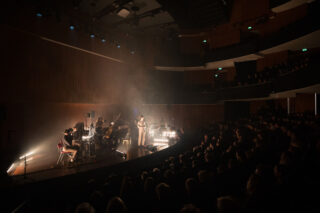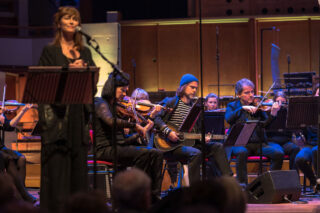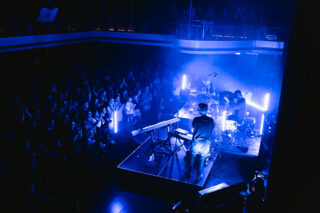Birds of Paradise Festival in Utrecht, where the artists are in control
A day-by-day account of Utrecht's Birds of Paradise festival, with Bryce Dessner, Luwten, Son Lux and Jlin

A day-by-day account of Utrecht's Birds of Paradise festival, with Bryce Dessner, Luwten, Son Lux and Jlin
In the main city square between the train station and old town of Utrecht, The Netherlands, the world-renowned TivoliVredenburg venue stands like a giant game of Connect Four, surrounded by water on each side. Face on, its mass grey exterior is decorated with hundreds of white circles, freckled by the occasional coke bottle clear window – a little glass counter falling into a completed row and left there forgotten, its architects having presumably run off for dinner – Mum’s calling.
Best known in the music world as the annual hosts of Le Guess Who? Festival, Utrecht is, in every sense, a city notorious for its quietude. Even the tourist board bashfully (and unfairly) claims one of its primary attractions to be its closeness to Amsterdam. But Birds of Paradise Festival, now entering its second year, has been meticulously curated in such a way that it invites the city into the music it showcases. Here, the people we pass are nicer than us; they speak more languages; the side streets are more beautiful; and the council, seemingly, more consolatory of its past mistakes (the main Catharijnesingel canal has recently been restored to its former watery glory following a brief life as a motorway). The beer here is better; the city stays awake longer; their night-ending meal is Patat Oorlog, a cone of chips topped with an extraordinary peanut and onion sauce, literally translated as “war chips.” All of this, joyfully, becomes as core to the festival weekend as the programmed art and music.
Walking along the old canal, the old site of the previous Tivoli venue looks like it’s being turned into flats. A teddy bear hangs by a piece of string in a tree opposite, whirling playfully over the water, like a discarded fairground prize caught in a particularly strong wind. It’s a world away from the new building, all sprawling escalators, ascending endlessly up, past a series of doors, each leading to a different venue. The festival isn’t the only promoter here this weekend; get the wrong door and it’s a Madchester rave, an Amadou & Miriam covers band or a college choir recital. Some people are dressed in three-piece suits, others are fitting their bowling shoes. Birds of Paradise is an inconspicuous host among the bustle; besides its Björkian logos projected either side of the venue stage, there’s nothing to say that it was here or it wasn’t.

Each night the festival headliner takes residency in one of the rooms at the Tivoli, with support acts and compositions brought and composed especially for this moment, and AI-ready translations of the room made into art that hangs in the venue foyer, hosted online as digital artist rooms. The first artist room is the wood-panelled concert hall, Grote Zaal, where composer Bryce Dessner – better known as guitarist of The National – sits before the Casco Phil orchestra, who play his Trombone Concerto with Jörgen van Rijen. The first movement enthrallingly isolates the trombone as a rhythmic pulse – seldom a soloist – driving the orchestra with one sharply repeated note, while the second and third movements colour a virtuosic dreamscape with drone-heavy backing. Van Rijen takes his plaudits, while two mirrored grand pianos take his place for sisters Katia and Marielle Labèque to play the conveniently titled Concerto for Two Pianos, then St. Carolyn by the Sea, recalling their Minimalist Dream House performance at the Barbican Centre pre-lockdown.
The night’s highlight is – as Dessner wryly suggested it might be – the one piece he didn’t compose. The world premiere of Complete Mountain Almanac saw him take a seat with the orchestra, for the collaboration between his sister – poet and visual artist Jessica Dessner – and Norwegian singer-songwriter Rebekka Karijord, tackling themes about the climate catastrophe and Dessner’s breast cancer diagnosis. Favouring the earlier months of the album for the setlist (album tracks titled ‘January’ through ‘December’), the standout is the exception: Karijord’s draped gown becomes its own bird of paradise, theatrically reaching skywards through repeated refrains of ‘October’ – “saw the earth / or the body.” Jessica joins on stage for a standing ovation, alongside her son, who had spent the majority of the performance heart-warmingly climbing over his chair to see people’s reactions, overawed.
Boldly going against the something-for-everyone culture of music festivals, Birds of Paradise flies with the this-thing-for-everyone approach. It’s the curatorial confidence that flourishes by putting Dessner in a concert hall one night, and following it up with sets of Dutch-language poetry the next, knowing that you’ll see both free from clashes and greet them in their own right.
It’s an approach instantly vindicated in the unsuspected highlights of night two, which opens with the weekend’s standout performance from photographer, sound and visual artist Laura Kampman, whose new composition of ambient electronic minimalism takes voice notes from the phone of that night’s headliner (Luwten’s Tessa Douwstra – main photograph) and weaves them around recordings from her own device. It softly becomes the meticulous sound of two previously alien lives being both disarmingly and tenderly connected. “Nothing is without an end, everybody dies sometimes,” goes one of the voice notes to close the set, before La Loye’s gorgeous indie folk recalls Adrianne Lenker, and novelist Bregje Hofstede reads an essay titled “Aan het begin” (“Ode to beginnings”).
It’s the kind of night that illuminates an audience’s readiness for in-depth experiences, sharply against passive listening. Hofstede’s essay is provided in the programme notes, and – slowly translated from Dutch – tells of her third relationship, which took more effort to grow than the first, knowing that the dreamt-of forevers are harder to believe in. But patience is necessary, and it becomes the mantra for this weekend – a manifesto for sitting silently and taking seriously the role of audience member.
Luwten finishes the second night where Kampman began, completing the demos that linger from her set and have taken residency in the walls of the room. The four members of Luwten are joined by brass cornets and a harpsichord from the baroque B.O.X. Ensemble, who fill out Douwstra’s pieces with a new optimism: now, “nothing is without an end, everybody is dying to begin again.” Songs alluding to the climate catastrophe recall Complete Mountain Almanac from the night before, the natural disasters recorded in many soundnotes now falling away, while Douwstra inhabits the spaces between Fiona Apple and Feist with the playful solus chorus line: “I am in over my head.” You can’t help but think she believes it; it’s the biggest performance they’ve done as a band, but it’s thoroughly compelling.
The concept of Artist Rooms now coloured, Brooklyn-based vocalist, composer and performance artist Holland Andrews delivered a dizzying set to open night three: helicopter synths interrupted by self-sung bird call, self-conducted operatics both beating and lush, droning and cinema noire. Cloaked in teal, their looped clarinet excursions linger long into the set, wandering deep into the dark before treading back and summoning the operatic drones, experimenting earnestly within the pockets of space afforded.

“I’m not crazy, I just hear voices,” they croon like a Keeley Forsyth b-side. Their’s is the kind of voice that bleeds out and folds into itself. An hour later, they rejoin the stage with Son Lux for ‘Sever’, as beams of blue light search the room. Ian Chang’s drumming at times would rival prime Rashied Ali. After ‘Last Light’, a complimentary, roaring heckle from a member of the crowd – “Ian Fucking Chang” – gets misheard on stage – somehow – as “you fucking jerk”, breaking the atmosphere for all of a second as the band confers. “We build a forcefield around insults,” sniffs back their confused frontman. Bigger things happen in Hollywood; six days prior to this performance, Son Lux were at the Oscar’s – the first band since The Beatles to pick up a nomination for Best Score – for their work on Everything Everywhere All At Once, a theme from which they encore ecstatically.
The penultimate set sees a collaboration between Belgian theatre director Benjamin Abel Meirhaeghe, Icelandic producer/composer Valgeir Sigurdsson and Belgian violinist Elisabeth Klinck, titled The Art of Listening. Sigurdsson’s electronic jabs punctuate ambling tales of fishermen and sonic reconstructions of Sheila Chandra’s voiced tabla composition, ‘Speaking in Tongues’. It’s the exact opposite to fellow Bedroom Community alumni, Nairobi’s KMRU, whose brilliantly transportive opening set revels in understated rituals of hazy noise: a midday journey to stillness, light fleecing in from the Connect Four windows.
Later that night, the final headliner – Indiana-based producer Jlin – sees adaptations of her work by Third Coast Percussion and the Ragazze Quartet, with only the occasional air of show-and-tell. But “the electronics part” of the night, as she introduces it, is little short of staggering. Few can earnestly list their influences to range from Nina Simone to Igor Stravinsky, while pulling off an hour-long headline set of Chicago footwork to a seated room. “I hope you like it, and if you think that it stinks, I understand that too,” she laughs.
The grime-laden ‘Rabbit Hole’ from Jlin’s most recent Embryo EP – which sounds out the monomaniacal hunt for a niche – blurts out the word “sausages”, a word that becomes a signature tell throughout her set. Purple light flashes over sparse industrial beats, ambient minimalism, IDM – “sausages” – and muddy hip-hop soundscapes, through tracks on her upcoming album Akoma, Ghanaian for “the heart”. “I’ll let y’all in on a little secret,” she smiles to end the festival. “Philip Glass and I did a track together called ‘Precision of Infinity’ and I’m just gonna let it play out for you.” She walks off the stage, admitting that she hasn’t actually learnt it herself yet. The room falls quiet as the opening notes play in […] “sausages, sausages, sausages.”
While the rooms scale down in size by day at Birds of Paradise, they don’t in their enormity. The festival has offered each of its headline artists complete control in their residencies; for one night, the representation of their complete artistic output is their’s to share, generously. It’s a feat that overwhelms most artists with gratitude on stage, and brings performances that overwhelmed most audiences across the weekend, too. Conceptually, there’s not a festival like it. Time to go spinning off into the night, peanut cone in hand.